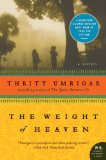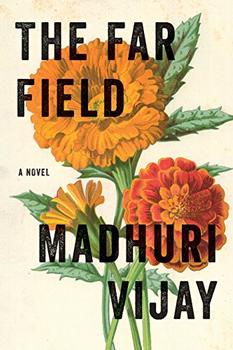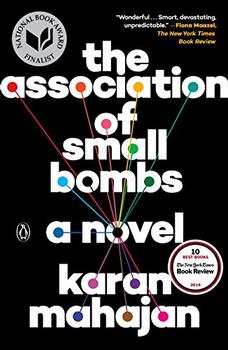Summary | Excerpt | Reading Guide | Reviews | Beyond the book | Read-Alikes | Genres & Themes | Author Bio

A Novel
by Thrity UmrigarAnyone who has read one of Thrity Umrigar's previous works will know what he
or she is getting into when picking up a copy of The Weight of Heaven.
Umrigar is superbly adept at putting her readers in a position to observe
heartrending circumstances. She is a keen observer of the
human condition, and is one of the rare authors who can realistically convey
every bit of what she sees to her readers. They are immersed in her characters'
lives from the first page, and don't emerge until the very end of the novel. The
level of tension and pain are nearly constant throughout; this is not a
"feel-good" book.
Seven-year-old Benny's death is the starting place for this novel, the point
from which all the pain and blame originate. While that event is tragic, the
novel's true focus is how Benny's parents, Frank and Ellie, move beyond it – or
fail to – and the way they interact with each other throughout their attempt at
recovery.
[Frank] turned toward Ellie and waited for the next flash of lightning to illuminate her face. They had exchanged a few aimless words since moving to the porch, but for the most part they had sat in an easy silence for which Frank was grateful. It was a contrast to most of their interactions these days, which were laced with bitterness and unspoken accusations. He knew he was losing Ellie, that she was slipping out of his hands like the sand that lay just beyond the front yard, but he seemed unable to prevent the slow erosion. What she wanted from him – forgiveness – he could not grant her. What he wanted from her – his son back – she couldn't give.
The Weight of Heaven is liberally laced with other heavy themes as well. The author deftly weaves her narrative with issues such as class and culture, faith in the face of tragedy, and morality. Frank's paternalistic relationship with his housekeepers' son can be read as an allegory for the United States's relationship to most of the rest of the world (developing countries in particular). Umrigar also addresses how Western cultures deal with others' tragedy. In one moving passage, Ellie asks an American friend if coping with Benny's death will ever get any easier:
I'll tell you something right now, Ellie, that nobody else is gonna tell you – the pain will never go away. It's always there, even years and years later. And there's so much pressure to bury it. It's just the way our culture is – even grief comes with an expiration date, you know? You're supposed to nod and smile because raw emotion embarrasses other people.
The book does lose a bit of steam in the middle, when Umrigar inserts two
oddly placed flashbacks. They're distracting, breaking up the novel's flow and adding
little value to the plot. In addition, the book contains overt political
statements that for the most part seem out of place and one-sided; it feels more
like a lecture aimed at the reader than a discussion between characters.
Those are minor quibbles, however. Overall The Weight of Heaven is
very well written and exceptionally engaging. While the topics addressed are
heavy, the book is actually a very fast read; readers will be hooked from the
first page. Those who are not afraid to tackle a book that deals with such
heartbreaking circumstances will find it a rewarding novel rich with
complexities.
About the Author
 A journalist for seventeen years, Thrity Umrigar has written for the Washington Post, the Cleveland Plain Dealer, and other national newspapers, and contributes regularly to the Boston Globe's book pages. She teaches creative writing and literature at Case Western Reserve University. She is the author of Bombay Time (2001), The Space Between Us (2006), If Today Be Sweet (2007) and the memoir First Darling of the Morning: Selected Memories of an Indian Childhood (2008). She was a winner of the Nieman Fellowship to Harvard University, has a Ph.D. in English and lives in Cleveland, Ohio.
A journalist for seventeen years, Thrity Umrigar has written for the Washington Post, the Cleveland Plain Dealer, and other national newspapers, and contributes regularly to the Boston Globe's book pages. She teaches creative writing and literature at Case Western Reserve University. She is the author of Bombay Time (2001), The Space Between Us (2006), If Today Be Sweet (2007) and the memoir First Darling of the Morning: Selected Memories of an Indian Childhood (2008). She was a winner of the Nieman Fellowship to Harvard University, has a Ph.D. in English and lives in Cleveland, Ohio.
![]() This review was originally published in The BookBrowse Review in May 2009, and has been updated for the
April 2010 edition.
Click here to go to this issue.
This review was originally published in The BookBrowse Review in May 2009, and has been updated for the
April 2010 edition.
Click here to go to this issue.

If you liked The Weight of Heaven, try these:

by Madhuri Vijay
Published 2019
Gorgeously tactile and sweeping in historical and socio-political scope, Pushcart Prize-winner Madhuri Vijay's The Far Field follows a complicated flaneuse across the Indian subcontinent as she reckons with her past, her desires, and the tumultuous present.

The Association of Small Bombs
by Karan Mahajan
Published 2016
The Association of Small Bombs is an expansive and deeply humane novel that is at once groundbreaking in its empathy, dazzling in its acuity, and ambitious in scope.
Your guide toexceptional books
BookBrowse seeks out and recommends the best in contemporary fiction and nonfiction—books that not only engage and entertain but also deepen our understanding of ourselves and the world around us.